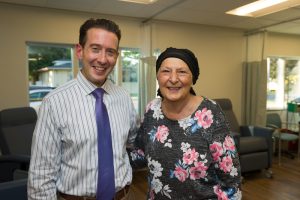
Early Signs of Inflammatory Breast Cancer
Regional Cancer Care Associates (RCCA) provides comprehensive treatment of cancer and blood disorders to patients throughout New Jersey, Connecticut, and the Washington, DC, area. Here,
HIPAA Alert: Potential Data Breach Learn More
Questions on Oncology, Hematology and/or Infusion Clinical Services due to COVID-19 Crisis – CALL 833-698-1623
Important Information for Our Patients Regarding the Coronavirus.
RCCA Providing Area Cancer Patients with Access to Care During Coronavirus Outbreak
RCCA Offering Patients Virtual Visits During Coronavirus Pandemic
Invasive ductal carcinoma is the most common type of breast cancer. This, and other cancer types are treated at Regional Cancer Care Associates (RCCA). RCCA is a group of more than 100 medical oncologists and hematologists who treat patients who have solid tumors, blood-based cancers and benign blood disorders at 25 locations throughout New Jersey, Connecticut, Massachusetts, and the Washington, DC area. They strive to educate patients while providing innovative care. RCCA offers cutting-edge treatments, including targeted therapy and hormone treatments.
Breast cancer, also called ductal carcinoma, occurs when cells in the breast start to develop abnormally. While healthy cells reproduce at a controlled rate to replace those that die, cancerous cells multiply quickly. This creates a constantly growing tumorous mass that crowds out normal cells.
Most breast cancer begins in the milk ducts. Over time, however, the cancer cells spread to tissues near the ducts. This can include fatty tissue, lymph nodes and vessels, skin, and even parts of the body beyond the breast. Cancer that has spread outside the milk ducts is called invasive ductal carcinoma.
Invasive ductal carcinoma (IDC) is the most prevalent kind of breast cancer, with the American Cancer Society stating that about 80% of breast cancers are invasive ductal carcinomas.

The severity of IDC depends on its stage. Breast cancer stages are used by medical oncologists to describe how large a cancerous tumor is and how far cancer cells have spread. Stages include:
Most patients diagnosed with Stage I and Stage II breast cancer will have successful treatment. Survival rates decline as cancer progresses. This is why early detection is so important to cancer treatment.
Every case of IDC is unique. Some individuals do not experience any symptoms. Others, meanwhile, may notice unexplained changes in their breasts. These signs and symptoms may include:
Not every change in the breasts is caused by cancer. Breasts can be affected by menstrual cycles, pregnancy, breastfeeding, weight changes, age, and other factors. Many people who experience the symptoms listed above will not have breast cancer. Nonetheless, it is important to consult a physician about these symptoms, particularly if they are pronounced, arose suddenly, or have persisted for an extended period.
Most cases of IDC are detected through routine mammogram screening. The mammogram image will reveal an abnormal mass in the breast tissue. If a mass is detected or if someone visits a doctor regarding breast cancer symptoms, further tests may be requested to confirm a diagnosis:
Mammograms are X-ray devices used to take detailed images of the interior breast structures. Diagnostic mammograms often use higher-quality equipment than routine screenings and take more images of the breast at different angles, allowing for a more thorough analysis.
Ultrasounds are sometimes used to complement mammogram results. This imaging technology uses sound waves. Unlike mammograms, which take pictures of the whole breast, ultrasounds typically focus on a specific area. This allows more precise assessment of suspicious areas.
Biopsies involve removing a small amount of tissue or fluid from a suspicious area. This sample is evaluated in a laboratory to confirm whether the cells are cancerous. It also determines characteristics such as hormone receptors and the presence of certain proteins to inform possible treatments.
Many early-stage cases of IDC are treated with surgery. Depending on the size of the tumor and the degree of spread, one of two procedures may be used:
If IDC has spread to the lymph nodes, a sentinel lymph node biopsy (SLND) or axillary lymph node dissection may also be performed. These procedures are done to remove cancerous lymph nodes and prevent further spread.
Radiation therapy is frequently used after surgery to treat IDC. This procedure involves targeting cancer cells with a focused dosage of radiation to kill cancer cells that could not be removed with surgery. Types of radiation treatment for cancer include:
Systemic therapies are treatments that affect the whole body, not just a focused area. This makes them effective in eliminating cancer cells that may have spread further in the body. They may also be used to shrink a tumor before surgery or radiation therapy, allowing for easier removal. Types include:
If cancer progresses to Stage IV, treatment focuses on prolonging and improving quality of life. Palliative care aims to reduce symptoms and enhance comfort for patients living with a long-term illness. Psychology and spiritual services are also available to help patients through the emotional impact of a Stage IV cancer diagnosis, while support groups connect patients with one another to combat loneliness.
Regional Cancer Care Associates specialists provide care to more than 30,000 new patients and 265,000 established patients each year. RCCA physicians offer patients innovative therapies, including immunotherapies and targeted therapy, cutting-edge diagnostics as well as access to approximately 300 clinical trials in community-based centers close to home. In addition to serving patients who have solid tumors, blood-based cancers, and benign blood disorders, RCCA care centers also provide infusion services to people with a number of non-oncologic conditions — including multiple sclerosis, Crohn’s disease, asthma, iron-deficiency anemia, and rheumatoid arthritis — who take intravenously-administered medications.
Invasive ductal carcinoma (IDC) is breast cancer that has spread beyond its point of origin in the milk ducts. It is the most common type of breast cancer, accounting for 80% of diagnoses.
The most common symptom of IDC is a new lump in the breast. Other symptoms include:
Most invasive ductal carcinoma is treated using surgery or radiation therapy. Systemic treatments such as chemotherapy, targeted therapy, immunotherapy, or hormone therapy may also be used to shrink the tumor before surgery.
Breast cancer patients can seek the most comprehensive, patient-centered care that the area has to offer at Regional Cancer Care Associates. Our network of highly experienced doctors works together to deliver the care and support you need for all aspects of your life. Call your local RCCA office to learn more about breast cancer or to schedule an appointment for a consultation today.

Regional Cancer Care Associates (RCCA) provides comprehensive treatment of cancer and blood disorders to patients throughout New Jersey, Connecticut, and the Washington, DC, area. Here,

When people think of breast cancer, they generally think of it affecting women. However, in rare circumstances, breast cancer can affect men, most commonly in

First diagnosed with breast cancer in 1992, she has persevered in her battle against the disease for more than 30 years.
When standard cancer treatments aren’t providing the results you want, clinical trials may offer hope. Our physicians use clinical trials to study new treatments, helping transform cancer care for the better. You can enroll in a clinical trial to try groundbreaking treatment plans at zero cost to you.

Regional Cancer Care Associates is one of fewer than 200 medical practices in the country selected to participate in the Oncology Care Model (OCM); a recent Medicare initiative aimed at improving care coordination and access to and quality of care for Medicare beneficiaries undergoing chemotherapy treatment.